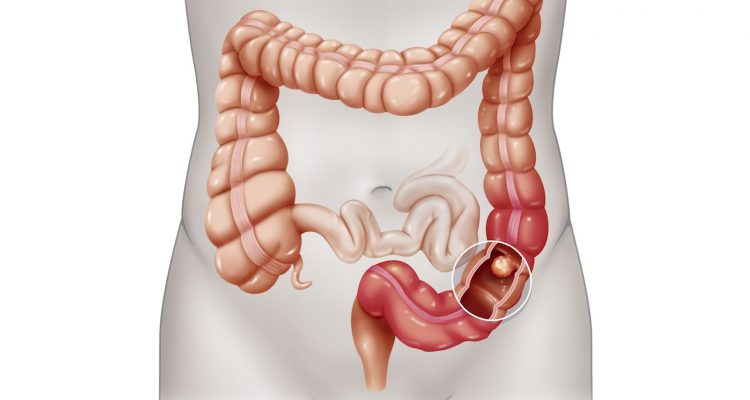Colon cancer is a tumor that occurs in the lining of the colon and rectum. This disease is also called colorectal cancer (from Latin colon – colon and rectum – rectum). About 50,000 cases of this type of cancer are registered in Russia every year. At risk are people prone to inflammatory bowel disease, although this is not the only factor that increases the likelihood of developing the disease.
Forecast
The prognosis depends on the stage at which the tumor was detected. If treatment is started in the first stage, the survival rate reaches 95%. But in the later stages, when metastases spread to vital organs, the patient’s chances of overcoming the disease are much less and, as a rule, do not exceed 14% 5. Therefore, in the fight against cancer, early diagnosis is extremely important, which remains today the main way to prevent the development of tumors.
Symptoms in men and women
The symptoms of bowel cancer in men and women are practically the same, but there are several nuances that you should be aware of in order to suspect the presence of a neoplasm in time.
Common early signs of colorectal cancer include:
weakness and fatigue;
constant feeling of abdominal discomfort;
frequent urge to defecate;
alternation of constipation and diarrhea;
a feeling of dissatisfaction after a bowel movement;
weight loss.
The appearance of these symptoms cannot be ignored: a timely visit to a doctor can save the patient’s health and life. However, the complaints listed above are not an absolute basis for establishing a diagnosis of colorectal cancer, although they indicate the development of a pathological process, which is important to diagnose in time. Chronic gastrointestinal diseases can be a risk factor for developing bowel cancer.
As the disease progresses, the clinical picture worsens. Against the background of narrowing of the intestinal lumen by a neoplasm, feces decrease in diameter (most often they become ribbon-like), blood may appear in them. In addition, other symptoms occur:
cramping pain during bowel movements;
constant feeling of nausea;
vomit;
bitter taste in the mouth;
heartburn;
sour belching;
headache;
temperature increase.
Features in men
In men, neoplasms most often occur in the rectum, which can complicate timely diagnosis. This is due to the fact that the signs of rectal cancer in many ways resemble the clinical picture of hemorrhoids. The most common symptoms are pain in the anus and blood in the stool.
Ic important @ 2x
Important!
By itself, hemorrhoids are already a prerequisite for the development of rectal cancer. Therefore, if in a patient suffering from hemorrhoids, symptoms such as unstable stools, weakness, prolonged fever, discomfort in the abdominal cavity, changes in the consistency and shape of feces join the usual clinical picture, you should immediately consult a specialist.
With metastasis in men, the prostate gland is often affected, which is manifested by painful urination, decreased libido, and discoloration of urine.
Features in women
In women, the colon is most commonly affected. The risk of developing a neoplasm increases significantly after menopause (that is, after 50 years). If in men one of the main prerequisites for the development of intestinal cancer is considered hemorrhoids, then in women tumors often arise as a result of the degeneration of intestinal polyps.
In addition to the symptoms already described for colorectal cancer, women with cancer may experience menstrual irregularities.
Ic important @ 2x
When metastasis occurs in women, the bladder is often affected, which can lead to the formation of a rectovaginal fistula (the passage between the vagina and the rectum). This, in turn, leads to the appearance of feces in the urine. There are severe pains in the intestines, which are often given to the rectal area.
Treatment
The main methods of treatment for bowel cancer:
Surgery. The gold standard is the laparoscopic https://en.wikipedia.org/wiki/Laparoscopy method, it has proven itself well and has become a routine treatment. With its help, both polyps and malignant tumors are removed. If the tumor is inoperable and blocks the intestinal lumen, a colostomy is formed (an artificial opening for excretion of feces) and palliative treatment is prescribed, the essence of which is to relieve pain in the patient.
Radiation therapy. Ionized radiation destroys the DNA of cancer cells, but can have side effects such as skin irritation at the site of application, indigestion and increased urination.
Chemotherapy. The use of drugs that have a detrimental effect on cancer cells.
Chemotherapy should be singled out separately, as it is one of the most actively developing areas.
In addition to conventional chemotherapy, biological methods of combating cancer using artificially synthesized antibodies are successfully used today: bevacizumab, cetuximab and panitumumab. These antibodies are created in order to, once in the body, specifically bind to receptors on the surface of cancer cells. As a result, a person’s own immunity begins to “see” these cells and effectively copes with the tumor.
Antibody therapy is most often combined with other targeted immunochemotherapy drugs.
